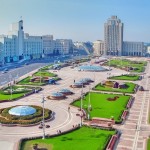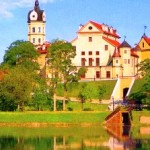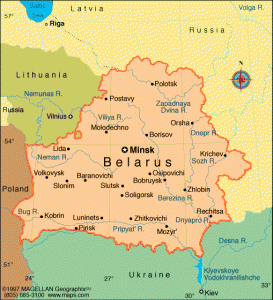Ülke Raporları- Belarus
Orman, odun ve enerji arasında çok yakın bir ilişki var. En basit haliyle köylerimizde, bir çok kasabamızda evlerimiz hala odunla ısınıyor. Yemeklerimiz odunla pişiriliyor.
Bunun olmadığını varsayarsak konu daha iyi anlaşılır.
Tabi teknoloji geliştikçe imkanlar da değişiyor. Orman Genel Müdür Yardımcısı olarak çalışıyorken Zonguldak’ ın bir köyüne ısınma için kömür dağıtıldığına şahit olmuştum. Beni çok etkileyen bir olaydı. Kömürün kirletici etkisi bir yana, yenilenebilir olmayışı bir yana.
Odundan elektrik üretilmesi, pelet ve çips haline getirilmesi gibi yeni teknolojiler mevcut. Bu konularda ciddi çalışmalar yürüttük, dünyadaki gelişmeleri takip etmeye gayret gösterdik.
Bu kapsamda FAOSEC Ofisinin daveti çerçevesinde 1-4 Haziran 2010 tarihlerinde Belarus’ un başkenti Minsk şehrinde yapılan bir çalıştaya iştirak ettim. FAOSEC’ ten Mustafa Çiftçi ve Enerji ve Tabi Kaynaklar Bakanlığından Genel Müdür Yardımcısı Hayati Çetin ile birlikte. Detayları aşağıda İngilizce olarak takdim ediyorum.
Bunun devamında 2-4 Eylül 2010 tarihlerinde İzmir’de “Uluslararası Enerji Türk Zirvesi” düzenlendi. Buraya katılıp Genel Müdürlüğümüz görüşlerini paylaştım. Bunun öncesinde ise 28 Şubat 2010 tarihinde Kastamonu’ da “Orman Biyokütlesi ve Biyoenerji Çalıştayı” nı yapmıştık. Konu uzun haliyle biz tekrar Minsk’e dönecek olursak, Ankara-İstanbul-Minsk yolu ile gidip döndük.
İnsan her gördüğünden çok şey kapıyor. keşke bütün arkadaşlarımıza dünyayı gösterebilsek. Belarus’la ilgili güzel bir web sayfası var burada
A regional workshop entitled “Policy Options for Wood Energy in CIS Countries” was held in Minsk, Belarus from 1 to 4 June 2010.
The meeting was organized by the Belarus Ministry of Forestry, together with the FAO subregional office for Central and Eastern Europe, the UNDP office in Belarus, UNIDO and the UNECE/FAO Forestry & Timber Section.
National experts from the forestry and energy sectors of Armenia, Azerbaijan, Belarus, Kazakhstan, the Republic of Moldova, the Russian Federation, Turkey, Ukraine and Uzbekistan reported on the status of wood energy in their countries.
To raise the profile of wood energy throughout that region, the experts recommended that public and private bodies concerned with energy and with forest management should work on achieving improved policy coherence and cooperate more closely. It is clear that the use of wood energy is mostly related to a country’s forest coverage and access to fossil fuel resources. In most countries, lack of infrastructure limits access to remote areas, thereby hampering the mobilization of wood. Participants nevertheless highlighted the potential contribution of wood from sanitary fellings to local wood energy production in rural areas.
Policy options for wood energy in CIS countries
Minsk, Belarus, 01/06/2010 – 04/06/2010
Eastern Europe, the Caucasian and the Central Asian regions can refer to a long tradition in the use of wood for heating particularly in rural areas. With the shift to market economy the countries energy needs have increased and frequently the growing needs could not been secured through markets.
There have been shortages in fossil fuel energy supply also in urban areas, which put additional pressure on forests and led to unsustainable forest cuttings. Nowadays, the use of fossil fuels (gas/oil) becomes more and more attractive also in rural areas, neglecting the environmental disadvantages of fossil fuel use. One reason for such a shift is to satisfy increasing needs in energy, another is the out-of-date technology used for individual energy generation from wood and other biomaterials. Considering the objectives for sustainable development in the target region it seems urgent to address the environmental advantages of renewable energies, such as wood or other bioenergy sources. High efficient energy technologies open new potentials for sustainable use of natural resources and integrated rural development.
This workshop addressed the environmental economic and social potentials for an effective, sustainable production and use of bioenergy in the CIS, focussing on wood. It aimed to explore market and policy options for promoting wood as a renewable energy source. Capacity building seems to be a tool for promoting advanced technologies related to the production and use of bioenergy from wood.
The workshop aimed to identify suitable national policies, to contribute to a shift towards bioenergy, balancing such an approach at the same time with environmental advantages of products, which compete on the energy and construction material markets. Also international projects could make an input to the broader use of bioenergy. The starting point will be the gathering and dissemination of robust data and information on bioenergy in order to evaluate the current status in the different countries sufficiently for policy decision making. Therefore country experts prepared national reports to provide an overview. The workshop targeted for links to small-scale enterprise and rural development.
Meeting documents
Presentations
Wood energy: definition, objectives and challenges Prof. Dr Branko Glavonjic, University of Belgrade Faculty of Forestry, Belgrade, Serbia
Wood energy data, markets and policy options Florian Steierer, Wood Energy Data Specialist, Hamburg University
Renaturalization of depleted peatlands managed by the forestry sector to combat land degradation and ensure conservation of globally valuable biodiversity in Belarus Olga Chabrouskaya, Project Manager, UNDP
National Initiative and Strategy Development for Strengthening Utilization of Wood Energy in Turkey Ismail Belen, Deputy General Director, General Directorate of Forestry, Turkish Republic
SEC Priorities & Activities for Forestry Sector in Central Asia Mustafa Ciftci, Junior Forestry Officer, FAO SEC
FAO Activities on Wood Energy in Eastern Europe Hubert Nimród Inhaizer, Forestry Consultant, FAO SEU
UNIDO activities in Newly Independent States Region with focus on Energy Projects Solomiya Omelyan, Field Operations Officer, UNIDO Europe and NIS Programme
Energy & Climate Change – the role of UNIDO Mark Draeck, Industrial Development officer, Rural and Renewable Energy Unit, Energy and Climate Change Branch, UNIDO
Options for Production Waste Minimization along the Wood Value Chain Juergen Hierold, Industrial Development officer, Agro-Industry Support Unit, Agribusiness Development Branch, UNIDO
Country presentations
Armenia (Energy) Армения
Armenia (Forestry – bilingual: En, Ru) Армения
Azerbaijan (Russian) Азербайджан
Belarus (Russian) Беларусь
Kazakhstan (Russian) Казахстан
Moldova (Russian) Молдова
Russia (Russian) Россия
Turkey Турция
Ukraine (Russian) Украина
Uzbekistan Узбекистан
Press
Geleceğe GÖNDERiler
Geleceğin, kişilerin hayalleriyle ve yaptıklarıyla şekilleneceğinin farkındayız. Herhangi bir şeyi daha iyiye götüreceğine inandığınız bir düşünceniz mi var? Herhangi bir konuda yeni bir fikriniz mi var? “Buldum” dediğiniz bir şey mi icat ettiniz? Heyecanınızı yürekten paylaşıyoruz. “Geleceğe GÖNDERi”lerinizi bizimle paylaşın, destek olalım! Lütfen görüş ve önerilerinizi gonder.carfu@gmail.com eposta adresi ile bizimle paylaşın. Köşe Yazıları bölümünde yazı […]







2 Responses to Ülke Raporları- Belarus